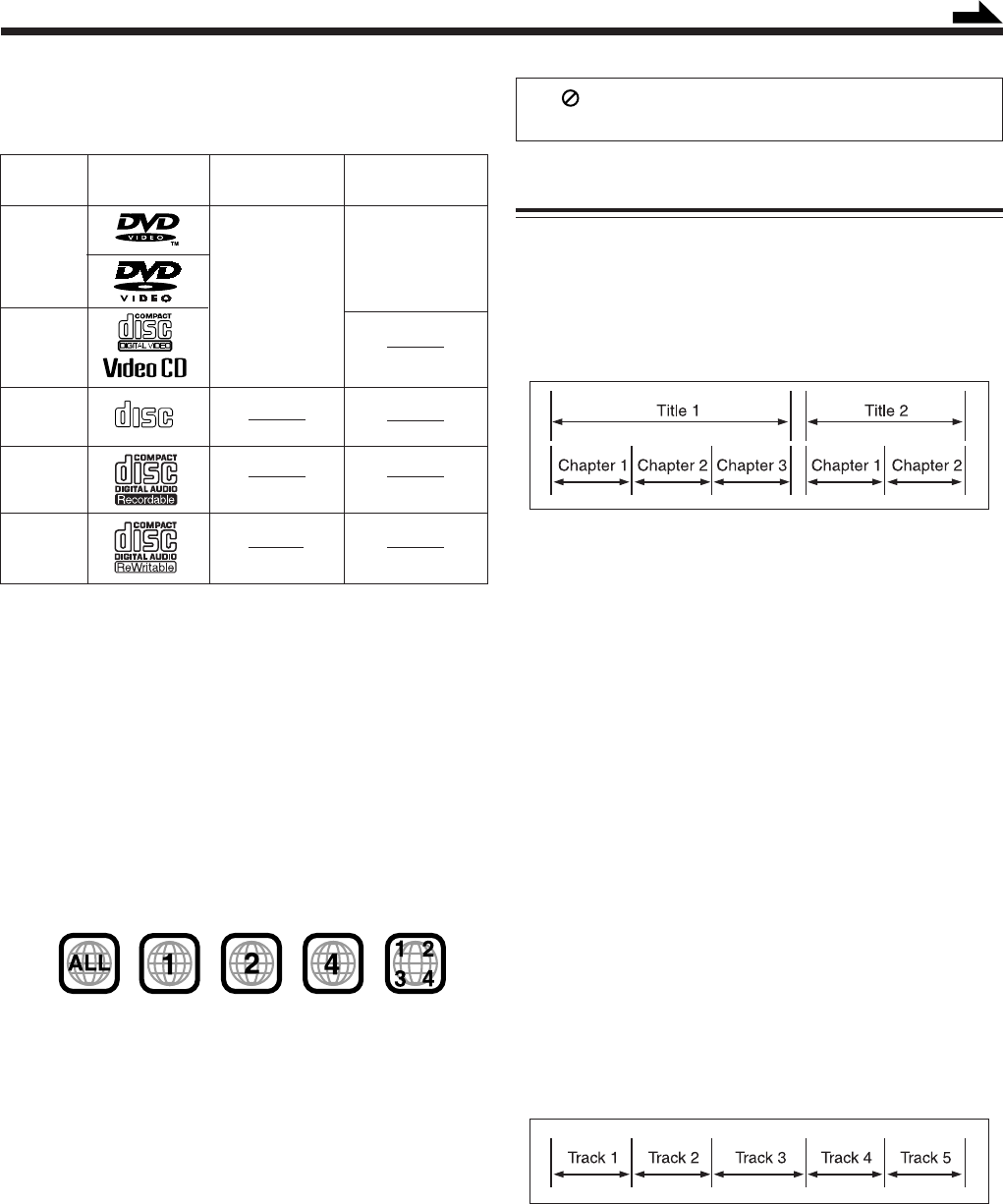
– 18 –
Playing Back Discs—Introduction
Disc Mark Video Region Code
Type (Logo) Format Number*
COMPACT
DIGITAL AUDIO
DVD
VIDEO
England: 2
Australia: 4
Others: 1
or ALL
Video
CD
Audio
CD
Discs you can play
This unit has been designed to play back discs having the
marks listed below.
CD-R**
CD-RW**
• On some discs, their actual operations may be different
from what is explained in this manual.
• The following discs cannot be played back;
DVD-AUDIO, DVD-ROM, DVD-RAM, DVD-R, DVD-RW,
S-VIDEO CD, CD-ROM, CD-I (CD-I Ready), Photo CD, etc.
Playing back these discs will generate noise and damage
the speakers.
• Continued use of irregular shape discs (heart-shape,
octagonal, etc.) can damage the unit.
* Note on Region Code
DVD players and DVD Video discs have their own Region Code
numbers. You can only playback DVD discs recorded with proper
video format and region code. Confirm the Region Code shown on
the rear of the unit.
** Note on CD-R and CD-RW
User-edited CD-Rs (CD-Recordable) and CD-RWs (CD-Rewritable)
can be played back only if they are already “finalized.”
• You can play back your original CD-Rs or CD-RWs recorded in
music CD format. (However, they may not be played back
depending on their characteristics or recording conditions.)
• Before playing back CD-Rs or CD-RWs, read their instructions or
cautions carefully.
• Some CD-Rs or CD-RWs may not be played back on this unit
because of their disc characteristics, damage or stain on them, or
if the player’s lens is dirty.
• CD-RWs may require a longer readout time. This is caused by the
fact that the reflectance of CD-RWs is lower than for regular CDs.
IMPORTANT:
Before performing any operations for DVD and VCD, make
sure of the following.
• Check the connection with the TV.
• Turn on the TV and select the correct input on the TV to view
the pictures or on-screen menus/indications on the TV screen.
If “ ” appears on the screen when pressing a button,
the disc cannot accept an operation you have tried to do.
Disc Structure
DVD
A DVD disc consists of Titles, and each title may be divided
into some Chapters.
For example, if a DVD disc contains some movies, each
movie may have its own title number, and it may be further
divided into some chapters.
How sounds are recorded on DVD
The digital audio format used for DVD differs among discs
and it is written on the package or disc itself.
This unit can only reproduce the sound recorded in the
following audio formats:
• Linear PCM—This is the same format used for Audio
CDs and Video CDs.
• Dolby Digital—This is an encoding method for audio
signals. By compressing audio signals, it can record up to
5.1 multichannel signals—the right front channel, left front
channel, center channel, and right rear channel, left rear
channel and LFE signals.
– While playing back a disc encoded with Dolby Digital on
this unit, the DOLBY DIGITAL lamp on the front panel
lights up. If it has multichannel signals—5.1ch, Surround
mode is automatically activated.
• MPEG Multichannel—This is a compression format for
PAL/SECAM DVD software. MPEG Multichannel is 5.1ch
multi surround using MPEG Audio coding format.
VCD and CD
A VCD or CD disc consists of Tracks.
In general, each song has its own track number. (On some
discs, each track may also be divided by Indexes.)
When playing back a VCD with the Playback Control (PBC*)
function, you can select what to view using the menu shown
on the TV screen. While operating a VCD using the menu,
some of the functions such as Time Search may not work.
* A VCD recorded with the PBC function has its own menus,
such as a list of the songs of the disc.
Ex.:
Continued
England: PAL
Australia: PAL
Others: NTSC
EN18-19.CA-MXDVA9&9R[A,B,UJ]_1 01.8.9, 7:21 PM18


















